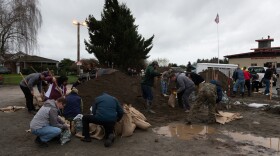A newly formed coalition of tribal leaders and communities of color plans to put its combined weight behind the latest voter initiative to curb carbon pollution.
Several tribal leaders launched a political action committee they have dubbed The First American Project. It aims to support public policies that protect the environment and human rights.
Their first major effort will be passage of I-1631 to put a price on carbon. The initiative appears to be headed to statewide ballots this fall.
Voters in Washington state rejected a bipartisan initiative in 2016 to reduce carbon emissions with a so-called revenue-neutral tax swap.
Despite efforts to address the needs of lower income neighborhoods that are harder hit by climate change, Gov. Jay Inslee’s most recent effort to get a carbon tax through the state legislature also failed in March.
But Fawn Sharp, President of the Quinault Indian Nation, announced the new political action committee saying its first major task is supporting I-1631. She says tribes and communities of color have a successful history of supporting each other in the face of crises dating back to the 1960s.
“Together, we have been able to champion some of the most progressive, meaningful and life-changing policies in civil rights, in fishing rights and we look forward to continuing to champion those causes as the national and local political landscape becomes more corrupted – by special interests and corporations,” Sharp said.
Sharp says the new group’s first priority is to mobilize voters to pass this latest carbon initiative, which aims to curb greenhouse gas emissions by imposing fees on large polluters. She says tribes and communities of color are often disproportionately affected by climate change.
Theresa Sheldon, a former councilwoman with the Tulalip Tribes, says tribes helped write I-1631. They want it to pass because their communities have already been harder hit by climate change, as have some lower income neighborhoods in urban areas.
She says groups of all kinds throughout the state need to come together to slow global warming.
“Collectively, an entire state can show the country how we can be better and how we can make that difference for Mother Earth – and for all of our children who have yet to come – to ensure that they actually have rivers they can swim in, that they can fish in; air they can breathe in, without asthma and allergies,” Sheldon said.
The First American Project says once I-1631 gets enough signatures to qualify for the fall ballot, residents of Washington state should expect to see a full-scale campaign that’s ready to stand up to the oil industry, which is expected to spend heavily on messaging that would work against the initiative.
Matthew Randazzo, state lobbyist for the Quinault Indian Nation and Executive Director of the new First American Project PAC, says calculating the exact cost to voters if the initiative is approved will be tough.
That’s because it’s not clear how much of the cost of fees on big polluters such as oil companies will pass on to consumers, for example through price hikes on things like gasoline. But he says the initiative is designed to offset some of that by using a portion of the fees to counteract negative impacts on people’s pocketbooks.
“A large percentage of the money - fifteen percent of the revenue - goes toward defraying the cost of this initiative on average, working class Washingtonians,” Randazzo said.
Sharp insists that there is enough frustration about the lack of climate action that this initiative will appeal to average voters. Faced with clear signs of climate change, such as more intense wildland forest fires, increasing storms and sea level rise, Sharp says people in Washington are fed up.
“There is a global crisis. None of us are immune from it. And every one of us should take ownership and responsibility to pay the price, but it shouldn’t be disproportionate, where the citizens pay the price and big oil corporations get exemptions” she said, adding that her community is a good example of a place where climate change is already having dramatic effects.
The Quinault’s homelands are perched on the far western edge of the Olympic Peninsula, where chronic flooding due to sea level rise has forced plans to relocate its lower village onto higher ground.
As of Friday, the campaign reported it had collected 286,187 of the approximately 300,000 signatures needed to make it onto the November ballot.
Asked about other priorities beyond this campaign, members of the PAC said they are also deeply concerned about current immigration policy, citing parallels between families separated at the borders now and past separation of Native American children from their parents because of federal policies that forced children into boarding schools and foster care.







